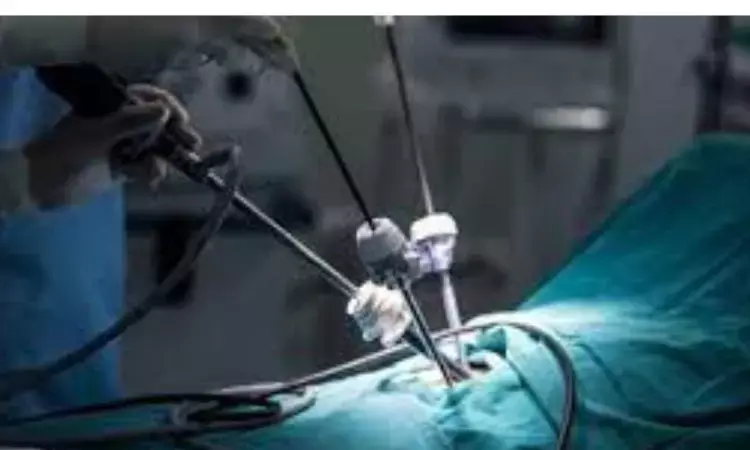- Home
- Medical news & Guidelines
- Anesthesiology
- Cardiology and CTVS
- Critical Care
- Dentistry
- Dermatology
- Diabetes and Endocrinology
- ENT
- Gastroenterology
- Medicine
- Nephrology
- Neurology
- Obstretics-Gynaecology
- Oncology
- Ophthalmology
- Orthopaedics
- Pediatrics-Neonatology
- Psychiatry
- Pulmonology
- Radiology
- Surgery
- Urology
- Laboratory Medicine
- Diet
- Nursing
- Paramedical
- Physiotherapy
- Health news
- Fact Check
- Bone Health Fact Check
- Brain Health Fact Check
- Cancer Related Fact Check
- Child Care Fact Check
- Dental and oral health fact check
- Diabetes and metabolic health fact check
- Diet and Nutrition Fact Check
- Eye and ENT Care Fact Check
- Fitness fact check
- Gut health fact check
- Heart health fact check
- Kidney health fact check
- Medical education fact check
- Men's health fact check
- Respiratory fact check
- Skin and hair care fact check
- Vaccine and Immunization fact check
- Women's health fact check
- AYUSH
- State News
- Andaman and Nicobar Islands
- Andhra Pradesh
- Arunachal Pradesh
- Assam
- Bihar
- Chandigarh
- Chattisgarh
- Dadra and Nagar Haveli
- Daman and Diu
- Delhi
- Goa
- Gujarat
- Haryana
- Himachal Pradesh
- Jammu & Kashmir
- Jharkhand
- Karnataka
- Kerala
- Ladakh
- Lakshadweep
- Madhya Pradesh
- Maharashtra
- Manipur
- Meghalaya
- Mizoram
- Nagaland
- Odisha
- Puducherry
- Punjab
- Rajasthan
- Sikkim
- Tamil Nadu
- Telangana
- Tripura
- Uttar Pradesh
- Uttrakhand
- West Bengal
- Medical Education
- Industry
Negative endoscopy reduces risk of upper GI cancer in GERD patients: Study

Sweden: In a new study conducted by Dag Holmberg and team, it was found that negative upper endoscopy is linked to significant and long-term reductions in the incidence and mortality of upper gastrointestinal cancer in patients with gastroesophageal reflux disease (GERD). The findings of this study were published in the journal Gastroenterology on 7th October 2021.
Gastroesophageal reflux disease is linked to an increased risk of upper gastrointestinal cancer. The researchers aimed to determine whether and to what extent a negative upper endoscopy in GERD patients is associated with a lower incidence and mortality in upper gastrointestinal cancer (esophageal, gastric, or duodenal cancer).
This was a population-based cohort study of all patients with newly diagnosed GERD in Denmark, Finland, Norway, and Sweden between July 1, 1979, and December 31, 2018. The exposure, negative upper endoscopy, was studied as a time-varying exposure, with participants contributing unexposed person-time from GERD diagnosis to screening and exposed person-time from the negative upper endoscopy. Upper gastrointestinal cancer incidence and mortality were assessed using parametric flexible models, which provided adjusted hazard ratios (HR) with 95 percent confidence intervals (CI).
The study's main finding was that an upper endoscopy with negative findings in patients with GERD was associated with a lower incidence and mortality rate of any upper gastrointestinal cancer and esophageal adenocarcinoma when analyzed separately. Incidence and mortality risk reductions lasted five and ten years, respectively. The lower risk of developing upper gastrointestinal cancer after a negative upper endoscopy was especially noticeable in the first year of follow-up, and then approached the incidence of participants who did not have endoscopy.
In conclusion, this population-based study from four Nordic countries shows that GERD patients who have a negative upper endoscopy have a lower incidence and mortality in upper gastrointestinal cancer after five and ten years, respectively. The more pronounced risk reduction beginning in 2008 suggests that higher-quality upper endoscopies in a modern setting have a powerful protective effect. Because of the relatively high incidence of upper gastrointestinal cancer in GERD patients, a one-time upper endoscopy may be beneficial.
Reference:
Holmberg D, Santoni G, Catarina von Euler-Chelpin M, Färkkilä M, Kauppila JH, Maret-Ouda J, Ness-Jensen E, Lagergren J, Incidence and mortality in upper gastrointestinal cancer after negative endoscopy for gastroesophageal reflux disease, Gastroenterology (2021), doi: https://doi.org/10.1053/j.gastro.2021.10.003.
Medical Dialogues consists of a team of passionate medical/scientific writers, led by doctors and healthcare researchers. Our team efforts to bring you updated and timely news about the important happenings of the medical and healthcare sector. Our editorial team can be reached at editorial@medicaldialogues.in.
Dr Kamal Kant Kohli-MBBS, DTCD- a chest specialist with more than 30 years of practice and a flair for writing clinical articles, Dr Kamal Kant Kohli joined Medical Dialogues as a Chief Editor of Medical News. Besides writing articles, as an editor, he proofreads and verifies all the medical content published on Medical Dialogues including those coming from journals, studies,medical conferences,guidelines etc. Email: drkohli@medicaldialogues.in. Contact no. 011-43720751


